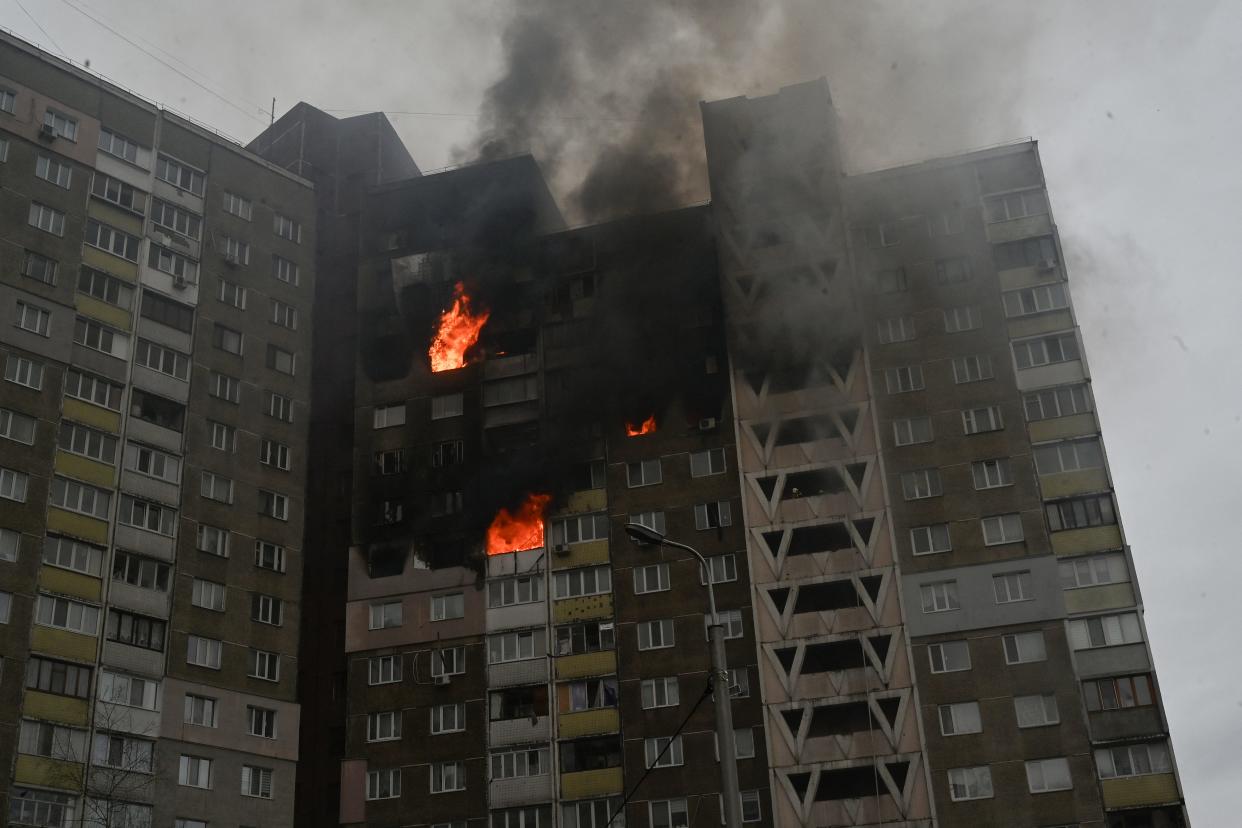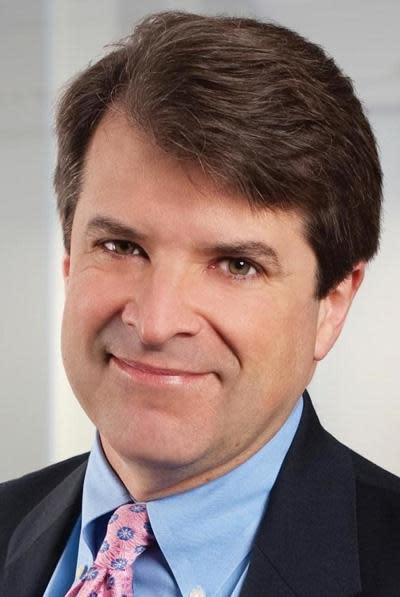Columnist: Why the conflict in Ukraine should matter to the United States

- Oops!Something went wrong.Please try again later.
This is a commentary by Mark Murphy, a local author and physician. He is a longtime contributor to the Savannah Morning News.
In 1936, Europe looked the other way when Adolf Hitler entered the Rhineland. Two years later, Germany annexed Austria. Wishing to avoid an all-out war with Germany, British Prime Minster Neville Chamberlain authored the Munich Agreement, which allowed Germany to occupy the Sudetenland, the German-speaking portion of what was then Czechoslovakia. In 1939, Hitler violated the Munich Agreement as he invaded Poland, starting World War II.
By the time the war ended, more than 73 million (24 million combatants and 49 million civilians) were dead.
In 2014, Russia annexed Crimea, which was at the time part of Ukraine. Although the U.N. adopted a resolution condemning the annexation, the world otherwise did very little.
In February 2022, Russian forces invaded Ukraine, hoping to topple an increasingly West-leaning government so that it could be turned back into a Russian satellite state. Russian leader Vladimir Putin falsely claimed that Russian-speaking individuals in the easternmost Ukrainian provinces called the Donbas were being discriminated against by “Nazis” in Ukraine and used that pretense as grounds for what he termed a “special military operation” against Ukraine.
The Ukrainians fought back, however. Eventually, most of the NATO alliance fully supported Ukrainian sovereignty, supplying the Ukrainian military with weapons and other materials they could use to turn back the Russian offensive.
Today, the Russian invasion of Ukraine is at a virtual stalemate. The numbers of those killed or wounded in action have been hard to ascertain, but the U.S. military has estimated that Russia has had more than 80,000 soldiers killed and 240,000 wounded, while Ukraine has had 70,000 soldiers killed and 100,000 wounded.
Approximately 9,000 Ukrainian civilians have also been killed. To put this into perspective, the U.S. lost 58,220 soldiers during the entire Vietnam War, 36,634 soldiers during the Korean War, and 2,402 during the war in Afghanistan.
After initial broad-based bipartisan support from the U.S., the flow of armament from the United States to Ukraine has recently all but stopped. And why has it stopped? Politics.
Throughout our history, the United States has been a bulwark of democracy, with more than a million American lives sacrificed to preserve the freedoms we hold so dear.
The most important point in the conflict is this one: Ukraine, a sovereign nation, was invaded by Russia under the orders of its President, Vladimir Putin, the leader of Russia since 1999. A former KGB agent, the longest-serving Russian leader since Joseph Stalin, Putin rules Russia with an iron fist. He has shown no hesitation in having opponents jailed, exiled, or even murdered to maintain power.
The politics of the Russia-Ukraine conflict have taken on significance in the United States because of Ukraine’s role in the first impeachment trial of former President Donald Trump. In 2019, President Trump attempted to coerce Ukraine into starting an investigation into then-candidate Joe Biden in exchange for releasing military aid to Ukraine, which had previously been approved by Congress.
The nonpartisan Government Accountability Office determined that these actions by President Trump were a violation of federal law. That conclusion, in turn, led to President Trump’s first impeachment.
Trump has had issues with Ukraine ever since. In his defense, President Trump cited concerns over “corruption” in Ukraine. There is no question that there has been a system of cronyism in place in that nation for years, as is commonplace in many former Soviet bloc countries. However, corruption concerns should never detract from the fundamental need of support for democracy, which has always been the traditional U.S. stance.
We have instead allowed partisan political divisions to interfere with that usually steadfast position. Something is seriously wrong with this picture.
There are those who say that what happens in Ukraine does not matter to us, that this is an internal dispute between two former Soviet bloc countries that has no significant bearing on the United States. Those people are wrong.
Russia has seen its international influence wane dramatically since the breakup of the USSR in 1991. The nation is an economic lightweight, with a GDP of about $2 trillion (by comparison, the state of California has a GDP of over $3.4 trillion). Russia’s military, once feared throughout the world, is a shell of its former self.
Russia’s wounded pride has made it inherently unstable. Much like pre-World War II Germany, it has staked its national pride on conflict and disruption, espousing the development of a “New World Order” in which the Western democracies, led by the United States, no longer hold sway. Russia has now allied itself with China, North Korea and Iran, nations who would like mothing better than to see the U.S. and its allies tear themselves apart.
Russia’s trump card in all of this is its vast stockpiles of nuclear weapons. It currently has nearly 6,000 nuclear warheads (NATO has roughly the same number). Both Russia and NATO have more than enough nuclear weaponry to end all life on earth as we know it.
If Russia successfully returns Ukraine to its orbit, all the other former Soviet bloc states will be at risk. Russian pride has become increasingly dependent upon the narrative that it has a right to expand to its former territorial borders to “protect itself” from the West.
With the Russian Bear backed into a corner, the possibility of a Russian attack on NATO becomes increasingly likely.
It is a possibility that we are not prepared for. Sonke Nietzel, one of Germany’s leading military historians, claims that his country would not be prepared to defend itself against a Russian attack for 15 years. Jacek Siewiera, Chief of Poland’s National Security Bureau, has warned his nation has three years to prepare itself for a Russian invasion on its eastern flank.
The Russian alliance with Iran, China, and North Korea is a loose aggregation of international misfits, but they have one thing in common: They all hate the United States. Moreover, they will do anything in their power to sow discord and mistrust in our country.
The Chinese have made no secret of their desire to invade Taiwan. Iran has designs on forming a united Islamic front in the Middle East and in Africa. The combination of Russian military manufacturing and nuclear weapons capability, Chinese economic might and technology, and raging jihadist fervor could usher in the unthinkable: Another worldwide conflict, but with enough deadly weaponry to annihilate the human race.

We need to be clear about who our true enemies are. Democrats are not our enemies. Republicans are not our enemies. Our enemies are those foreign powers whose most fervent wish is the failure of our democracy and the collapse of the U.S. role as the leader of the free world. Russia, China, Iran, and North Korea want us to fail. We cannot allow political differences to distract us from the bigger geopolitical issues which loom just over the horizon.
While we bicker among ourselves, fighting meaningless skirmishes over whose political party will hold sway in Washington, our true enemies are busy plotting the next Great Conflict.
There is a saying, dating back to Roman times: If we would have peace, we should prepare for war. Teddy Roosevelt paraphrased that sentiment with the phrase, “Speak softly and carry a big stick.”
Today, we need that big stick in Ukraine. Democracy depends upon it.
This article originally appeared on Savannah Morning News: Columnist: Why the conflict in Ukraine should matter to us

